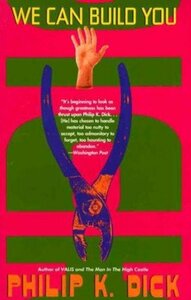Take a photo of a barcode or cover
“Hell,' I said, 'love is an American cult. We take it too seriously; it's practically a national religion.”
― Philip K. Dick, We Can Build You

Is this a PKD novel? Does it contain?
1. Madness? Yes.
2. Paranoia? Yes.
3. Simulacra? Yes.
4. Hallucinations? Yes.
5. Funky inventions? Yes.
6. Metaphysical explorations of what it means to be alive? Hell yes.
7. Loneliness? Yes.
8. Theology? Not so much.
9. A Fascist-type government? Yes, subtle, but yes (see comments below).
10. A Large Omnipresent Industry? Yes.
11. Unreliable narrator? Yes.
12. Life on another planet? Yes.
13. A Murder? Yes.
14. A US President? Yes.
15. Has it been made into a movie? Not that I'm aware of.
This novel scores 12/15 on the PKD meter, and most certainly is a work of PKD.

The aspect of PKD novels that works for me, I've recently decided, is their ability to span an almost base-level of human existence. He grabs the greasy hair, wrinkled clothes-level but links it directly to some metaphysical otherworldliness. He does this not only through his exploration of big themes and ideas, but also through clever beginnings.
I love the idea that the company that starts making simulacra in this novel was a small, Western electronic organ company that is trying to schlep its organs to various people using sleazy sales practices. Because of a changing economy, the management of the company arrives at the idea of constructing a simulacra of both Edwin M. Stanton AND Abraham Lincoln. Genius. Anyway, the simulacrum idea is the catalyst that Dick uses to explore his often examined ideas about what it means to be alive, human and to love. I adore that both Lincoln and Stanton appear both just as alive and probably more rational than most of the humans they are interacting with. I love that Lincoln ends up giving relationship advice to the narrator (who happens to be in love with a woman who today would out spectrum Sheldon Cooper). Anyway, it was good, solid PKD. Not a place to start, but if you find yourself on a PKD tear, not a bad book to drive through.
― Philip K. Dick, We Can Build You

Is this a PKD novel? Does it contain?
1. Madness? Yes.
2. Paranoia? Yes.
3. Simulacra? Yes.
4. Hallucinations? Yes.
5. Funky inventions? Yes.
6. Metaphysical explorations of what it means to be alive? Hell yes.
7. Loneliness? Yes.
8. Theology? Not so much.
9. A Fascist-type government? Yes, subtle, but yes (see comments below).
10. A Large Omnipresent Industry? Yes.
11. Unreliable narrator? Yes.
12. Life on another planet? Yes.
13. A Murder? Yes.
14. A US President? Yes.
15. Has it been made into a movie? Not that I'm aware of.
This novel scores 12/15 on the PKD meter, and most certainly is a work of PKD.

The aspect of PKD novels that works for me, I've recently decided, is their ability to span an almost base-level of human existence. He grabs the greasy hair, wrinkled clothes-level but links it directly to some metaphysical otherworldliness. He does this not only through his exploration of big themes and ideas, but also through clever beginnings.
I love the idea that the company that starts making simulacra in this novel was a small, Western electronic organ company that is trying to schlep its organs to various people using sleazy sales practices. Because of a changing economy, the management of the company arrives at the idea of constructing a simulacra of both Edwin M. Stanton AND Abraham Lincoln. Genius. Anyway, the simulacrum idea is the catalyst that Dick uses to explore his often examined ideas about what it means to be alive, human and to love. I adore that both Lincoln and Stanton appear both just as alive and probably more rational than most of the humans they are interacting with. I love that Lincoln ends up giving relationship advice to the narrator (who happens to be in love with a woman who today would out spectrum Sheldon Cooper). Anyway, it was good, solid PKD. Not a place to start, but if you find yourself on a PKD tear, not a bad book to drive through.
feels really different than other pkd books, somehow
dark
funny
slow-paced
Strong character development:
No
Loveable characters:
No
Diverse cast of characters:
No
Flaws of characters a main focus:
Yes
